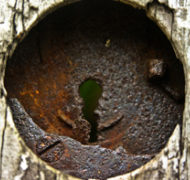It’s Not What You Think
Blog / Produced by The High Calling
Around the table, a group of people sat and discussed art. We had just opened the Cody Center at Laity Lodge, and we were interested in how the arts might be fully integrated with our programs and enhance the creative side of our guests. Ginger Geyer and Brenda Kingery were ready to serve as curators to the art gallery. Charles Webb had assisted in selecting just the right Steinway piano. Billy Crockett, Greg Wolfe, and Yandall Woodfin were at the table too.
The discussion was fascinating in scope and depth. After a couple hours of intense dialogue, we took a breath. Billy Crockett turned to me and asked about my role at the Foundations for Laity Renewal. I said, “I’m a poet.” Over Billy’s shoulder, I could see our COO, David Rogers, roll his eyes.
Undeterred by my boss’s ”just tell him what you do“ expression, I told Billy, “I’m a psychological, ontological, epistemological, theologian. P – O – E – T.” David smiled in approval, and I explained each element more fully.
- Psychological—because we emphasize relationships and take human behavior seriously.
- Ontological—because we focus much of our work on helping people find meaning and purpose.
- Epistemological—because we believe knowledge follows naturally from Christ, "the Word" or logos(the Greek word for reason).
- Theologian—because I apply these three areas of our mission to the understanding of who God is and what he is calling us to do.
The conversation moved on, but the moment remained significant for me. Spontaneously and creatively, I had described my role in the organization in a way that redefined my work. It was an epiphany.
I know the explanation is a bit heady and calling myself a “poet” was a bit tongue-in-cheek, but there’s a real sense in which I have embraced the role I described. I’ve learned about the meter of life, the rhythm of work and play, the balance of calling and living. Living with people in the kingdom of God means that we are in relationship with each other—only through God’s grace can we hope to manage it.
Photograph "key hole" by Elizabeth Weller, used with permission.





